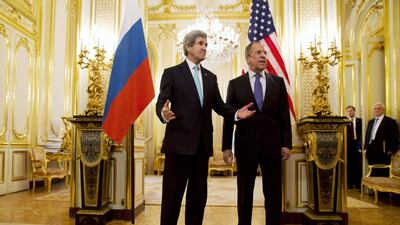BEIRUT // The US is willing to hold talks with Russia on the conflict in Syria amid rising concerns about Moscow's military build-up in the country.
Washington is willing to hold "tactical, practical discussions" with the Kremlin, White House spokesman Josh Earnest said on Thursday.
Earlier in the day, Russian foreign minister Sergei Lavrov urged the United States to see the government of president Bashar Al Assad as a "partner and ally in the fight against the ISIL" and offered to provide information to Washington about its military cooperation with Damascus.
"There is no reason to evade cooperation with the Syrian leadership, which confronts that terror threat," Mr Lavrov said.
Despite the professed focus on terrorism, the Russian military build-up also appears aimed at reasserting power in a region Moscow has lost influence in following the end of the Cold War.
"I think it's an important turning point, not just for Syria, but possibly the power relations in the Middle East," said Paul Salem, vice president for policy and research at the Washington-based Middle East Institute.
Russian president Vladimir Putin "has been trying over the last five years to bring Russia back to prominence on the world stage ... projecting that [military] power beyond his neighbourhood and bringing back the Middle East after an absence of two or three decades, I think that's part of his broader vision."
The US believes Russia has recently moved troops, tanks, artillery, helicopter gunships, prefabricated housing units for hundreds of people and other equipment to Syria's Latakia province.
It remains unknown how large a force Russia is planning on deploying in Syria and what the scope of their mission will be.
US secretary of state John Kerry has had at least three phone calls with Mr Lavrov over the past ten days as public concern mounted and new details emerged about Russia's military build-up in Syria.
On Wednesday, Mr Kerry said Mr Lavrov had proposed "military-to-military" dialogue between Washington and Moscow over Syria that could begin in the coming days.
Mr Lavrov also said Russia was looking to confront ISIL in Syria, a move White House spokesman Josh Earnest said would be welcomed by the US.
But there remain strong misgivings about Russia's intentions in Syria, given Mr Putin's continued backing of the Assad regime during the civil war, estimated to have killed 250,000 people.
Joshua Landis, director of the University of Oklahoma's Center of Middle East Studies, said Russia likely decided to get more involved in the conflict to protect an increasingly weak Syrian government.
But Europe's urgency to stem the flow of refugees heading for their borders, the recent failures of the US to project power on the ground inside Syria and the frustration of many over the lack of progress against ISIL were advantageous to the timing of Russia's moves, he said.
Jeffrey White, a defence fellow at the Washington Institute for Near East Policy, described Russia's move into Syria as "a logical extension of what they've been doing over the past four to five years".
"Also, it's a deterrent or a cause for caution for those people who are supporting the rebels militarily. Most of them probably don't want to get involved in a serious confrontation with Russia."
The Russian military build-up in Syria comes at a time when US efforts to intervene on the ground in Syria have been seen as floundering.
On Wednesday, US central command commander Gen Lloyd Austin told the senate armed services committee that only "four or five" fighters from the US' selective train-and-equip programme for rebels remain on the battlefield in Syria. The 54 rebel fighters in the programme's first class were quickly defeated by Al Qaeda affiliate Jabhat Al Nusra in late July.
When the US announced the programme late last year, they estimated that they would field about 5,000 trained, equipped and vetted Syrian fighters ready within a year.
For Washington, the introduction of Russian troops will complicate any potential future attempts to back Syrian rebels.
"I think the presence of Russian forces ... makes the administration even more wary, they feel this is not a fight that is easily won and has so many risks anyway. And now the additional risk of possibly tangling with Russian aircraft would make them more hesitant and tentative," said Mr Salem.
Mr White, the defence analyst, also sees the US with their backs against the wall in their ability to influence the military situation inside Syria.
"There aren't very many practical things we can do unless we're prepared to take the Russians on, and that means confronting them militarily."
Despite the renewed talks between Washington and Moscow over Syria, Mr Landis said it will likely be too costly for the US to make concessions to Russia or the Syrian government.
For the US, "if you accept that Assad is going to stay, you have to compromise very deeply with your most cherished values - democracy promotion, human rights ... So it's really not worth it for the United States to compromise on these core values to stop the killing", he said.
But Mr Landis says Russia is playing a dangerous game by getting involved with boots on the ground in a country where international actors have been extremely hesitant to directly intervene.
"Syria is a Vietnam waiting to happen for whoever dares step in. That's why no powers have allowed themselves to get sucked in," he said.
foreign.desk@thenational.ae

US and Russia willing to hold talks on Syrian conflict
It comes amid rising concerns about Moscow's military build-up in Syria, writes Josh Wood.
Most popular today
